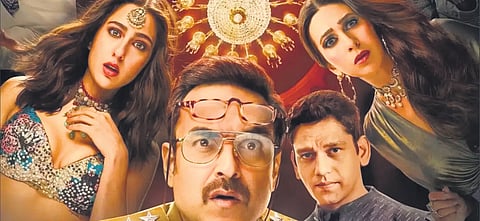

Homi Adjania on directing his first murder mystery, Murder Mubarak, why casting Pankaj Tripathi was non-negotiable, and why he finds OTT liberating
Your latest film, Murder Mubarak, is an adaptation of Anuja Chauhan’s Agatha Christie-inspired whodunit Club You To Death. What drew you to this layered narrative set around Delhi’s high society?
I was drawn to the screenplay written by Ghazal Dahliwal and Suprotim Sengupta. The writers carved out a primarily whodunit angle set against this “gymkhana” world, and the subset of Delhi’s elite society. The posh, old Delhi lot, where old money is clashing with new money; who has got membership and who hasn’t; it was that world that drew me in.
I have grown up in these clubs and have seen this world where they are so caught up in this little microcosm of delusion; where the politics of the club are more important than the politics of the country. Validation for them is based on what each member thinks, and their entire existence is defined by their life in the club. To create this world, and the narrative of the classic whodunit, which dominates the plot, was exciting for me.
This is the first murder mystery film that you’ve directed. How did it challenge you?
They can be tricky. One has to intelligently pepper it with intrigue points, in terms of plotting characters, why they are here and not there, and then you leave the breadcrumbs and red herrings for the viewer. What is most important is to close up all the loose ends, otherwise the audience feels shortchanged. So, you must show everything to the audience, maybe through a different lens. Then, you play this convoluted game-of-sorts to make them guess, and then hit a dead wall and start on a different trail all over again.
The writing is the key factor because that’s where all the questions are pulled up, and once you have the material on paper, it becomes easy for the director to translate it in terms of execution and performance. The only thing that gets a little difficult for me is that I tend to keep certain reactions or responses ambivalent, so it can be construed in one way or the other. This is to avoid giving full closure to any situation.
The film has an ensemble cast—from Dimple Kapadia and Pankaj Tripathi to Karisma Kapoor and Sara Ali Khan. What was it like getting them all together?
One of the main reasons I wanted to do this film was to work with Pankaj Tripathi, and I was clear that whatever the cast, he was not replaceable. That was non-negotiable at my end because I knew what he would bring to the table. He is the eyes of the viewer into this bizarre world. The casting director had given me an exhaustive list of people.
I loved Karisma as this yesteryear cult actress, who used to be popular, and Dimple as this bored martini-drinking housewife, who makes ghastly sculptures. These were interesting characters to create, and the casting came organically. Dimple is amazing, she is a habit for me, I can not have her in my films. Though these were diverse people, their energy was infectious.
Is it creatively more liberating when you are making a film for a streaming platform like Netflix vis-a-vis the demands of a theatrical release?
It certainly is. You are not weighed down by the pressure of a Friday or box-office numbers. Neither are you weighed down by working with names, which will be a great marketing vehicle too, or a producer asking you to throw in an extra song or two. As a storyteller, one gets a wider canvas to explore in terms of creativity and performances, as well as access to a wide audience. You are not bogged down by whether it is massy or commercial enough. The big screen has its appeal and charm, but it comes with its challenges.
You had said in the past that once you cross 50, and everyone else would be retiring, you would start making movies regularly, and you have been busier than ever in the past few years. Tell us more.
Well, earlier I was busy living the ‘rest of my life’. Now, as other activities (read adventure/contact) sports and hectic travel) slow down, I find myself enjoying the process of making a film.